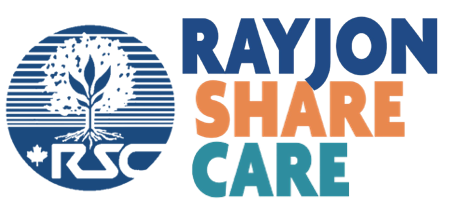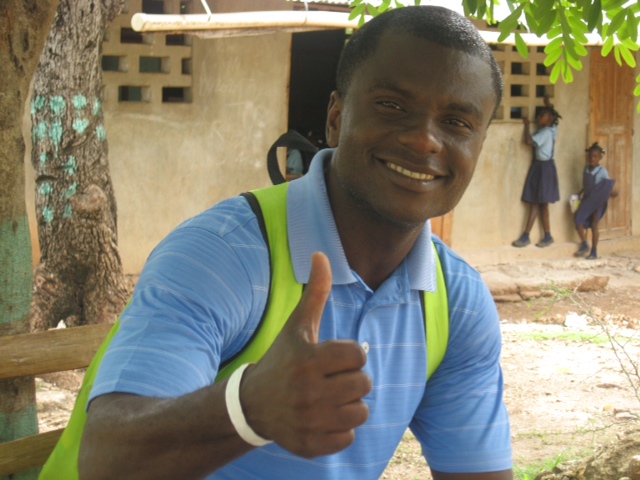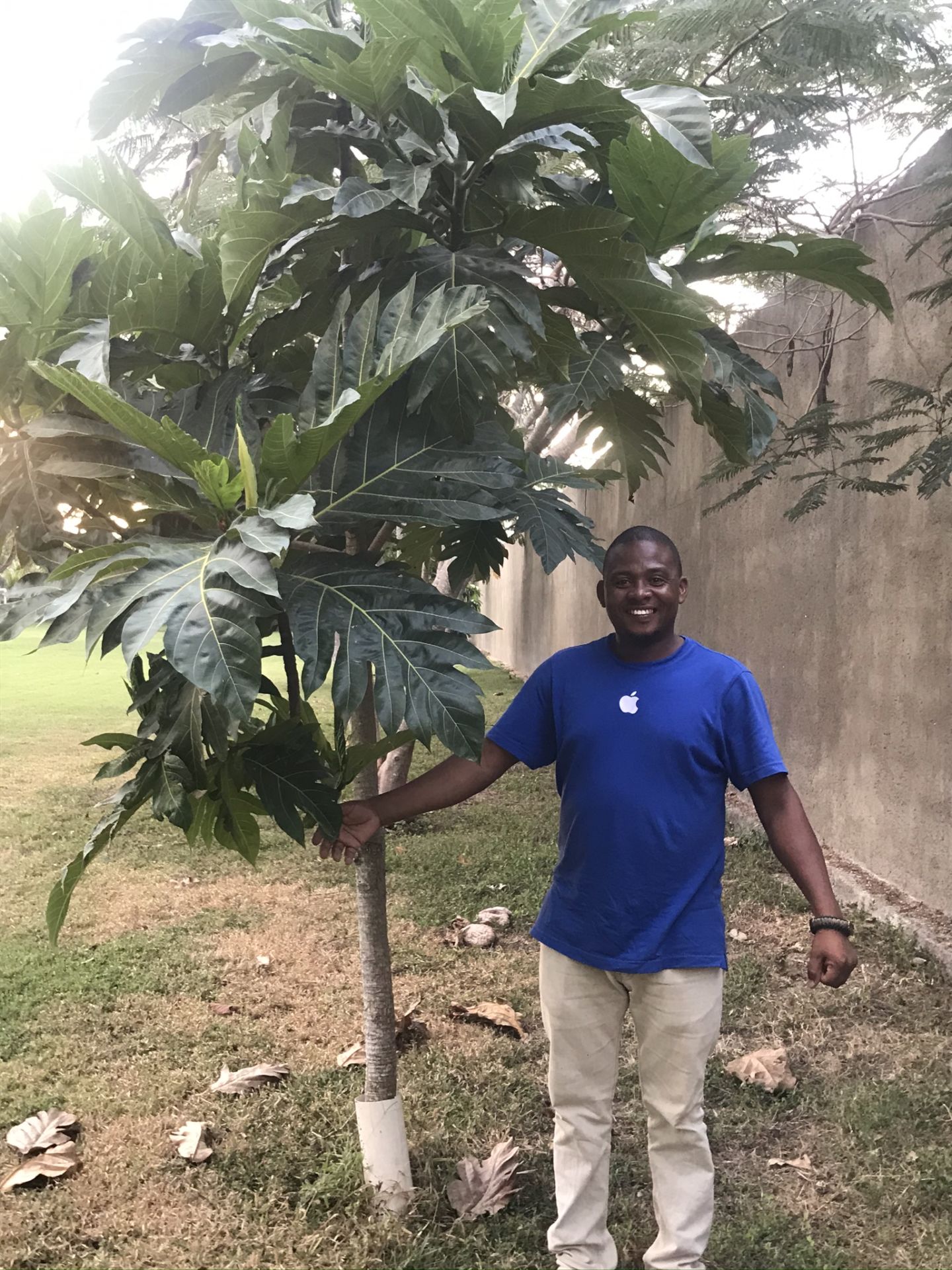Rayjon’s approach is one of partnership. Community development projects are inspired, directed, and implemented by our innovative and talented Haitian and Dominican partners. They know best what the real needs of their communities are and how to solve them.
Where We Work: Haiti
In Haiti we work in two primary locations, with two primary local partners: in urban Cap Haitian with the Centre for Education & Nutrition for Women & Children (C-NEW-C), and in rural St. Marc, with Rayjon Share Care Haiti (RSCH).
Over the course of decades we have developed strong working relationships with C-NEW-C and RSCH, excellent systems of communication, trust and accountability, and a deep understanding of and connection with the communities they serve.
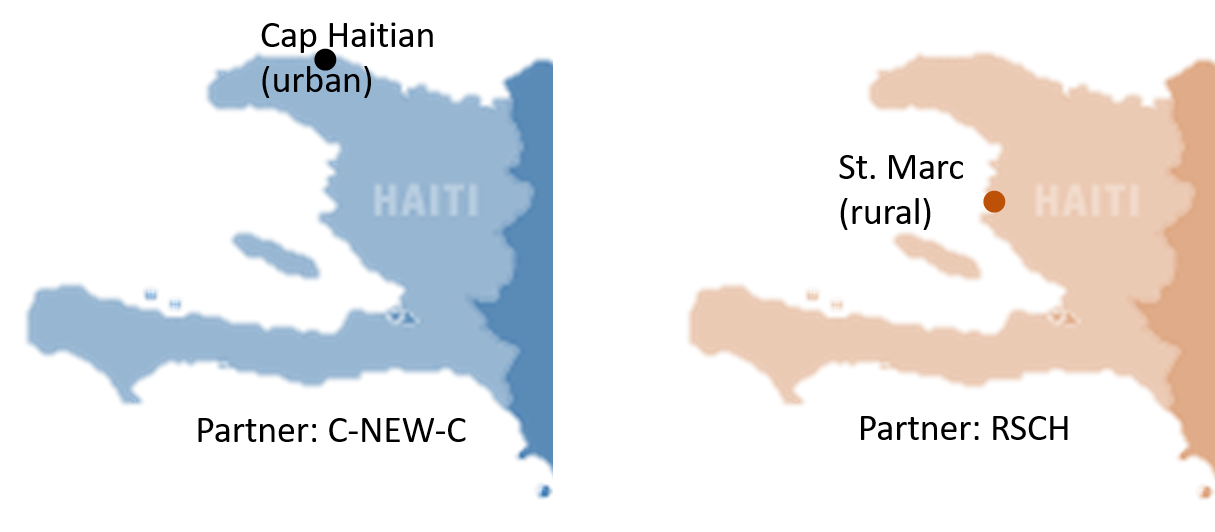
Rayjon-supported programs in Cap Haitian, Haiti at the Centre for Nutrition & Education for Women & Children (C-NEW-C)
Rayjon in Canada has been connected with the C-NEW-C since the late 1990s. The C-NEW-C was originally founded by the Sisters of St. Joseph (Toronto), who continue to provide generous financial support.
Today, the C-NEW-C is recognized as an independent Haitian organization, operated by a strong team of Haitian nationals, under the direction of Andre Jean-Pierre, and with financial support from Rayjon and the SSJT.
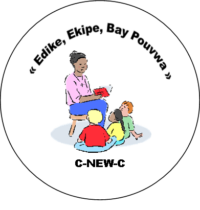
Based in the center of Cap Haitian (the second largest city in Haiti) the C-NEW-C’s holistic model is one of its kind in the area. Programs interconnect in such a way that underlying causes of poverty are being addressed. Parents and caregivers develop skills that will help them to better care and provide for their families.
Key Programs at the C-NEW-C, and funded by Rayjon, include:
LifeSkills for Women
→
Tuition Support Program
→
Nutrition Program
→
Post-Secondary Scholarships
→
Programs at the C-NEW-C are empowering female heads of households experiencing extreme poverty. Training in literacy, numeracy, health & hygiene, nutrition and healthy cooking for a family, practical skills and more is empowering families to gain knowledge to keep their children healthy, prepare nutritious meals, develop self-esteem and create job opportunities.
Rural St. Marc Region, Haiti in partnership with Rayjon Share Care Haiti (RSCH)
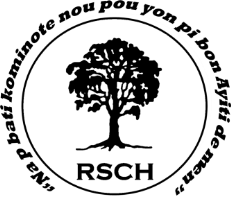
The mountainous villages surrounding the city of St. Marc were among the first places that original members of Rayjon Canada visited. We have been proud to partner with these rural communities for more than 37 years.
The progress they have made is incredible!
RSCH provides logistic and financial support to community partners, to help them acheive their goals in sustainable development. Key partners and programs include:
Haitian Women’s Federation (FEFEH)
→
“Alpha” Adult Literacy
Program
→
Women’s Microcredit
→
The Haitian Women’s Federation of St. Marc
Fédération des Femmes de Haut de Saint-Marc (FEFEH)
The Haitian Women’s Federation, also known as “FEHFEH” is a grassroots, nationally recognized organization, made up of smaller women’s associations in 7 distinct villages in the rural St. Marc area. They are 350+ women strong!
Their democratically elected leadership is responsible for bringing the voices, ideas, and contributions of membership together to work toward common goals in Education, Health Care, Women’s Entrepreneurship, and more. They have successfully established a sustainable processing factory and tree nursery, generating reliable income to invest back into their communities.
Alpha Adult Literacy Program
With support from RSCH and the Women’s Federation, Alpha Adult Literacy classes will be active in 5 villages, with 175 participants, from the ages of 18-78. 84% of participants are women.
In addition to essential literacy skills, the program also teachers numeracy (needed to function in a marketplace economy), leadership and civil participation. Graduates of this 4-year program go on to be leaders in their communities, often teaching others.
Pinson Community School
→
Under the leadership of the Haitian Women’s Federation, the Microcredit Program is flourishing. The women boast a 100% repayment rate! To date, more than 300 women have received business training and loans!
Way up in the mountains, the Pinson Community School is home to more than 250 bright young minds from K-6. In this marginalized, remote community, community-based leadership matters.
Where We Work: Dominican Republic
Rayjon in Canada has been connected with communities in the Consuelo region of Dominican Republic since 1989. Our connections there have grown in exciting ways, from original very small scale support of a tiny preschool, to supporting the incredible efforts of 3 long-term partners, who are doing tremendous things in the areas of:
Education Health Care Women’s Entrepreneurship
Human Rights
Community Development Water/Housing/Sanitation
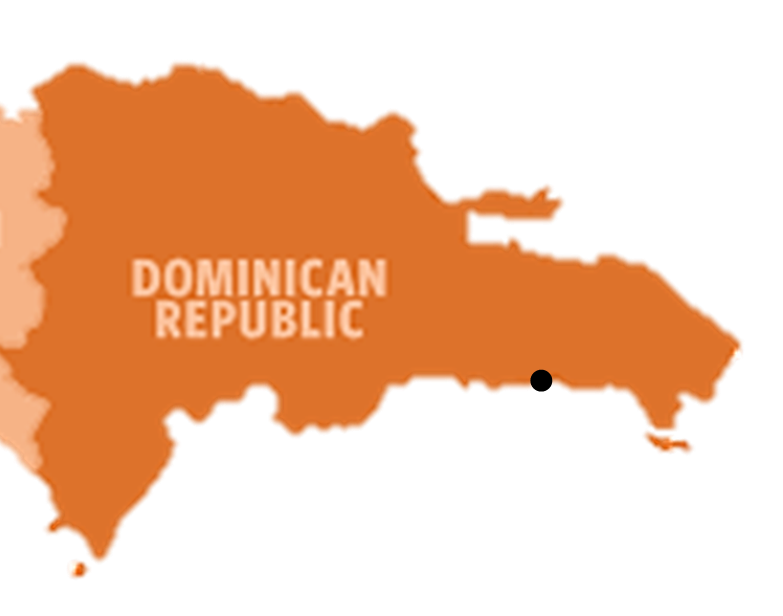
Read on to learn more about each of our 3 Dominican partners, and the impressive results they are achieving:
Consuelo Community Development Project, Barrio 41, Dominican Republic
in partnership with “PLADESCULBA”
The marginalized neighbourhood of Barrio 41 is the first Dominican community that Rayjon began actively supporting in 2003. The community itself began in 1998, after Hurricane George devastated several sugarcane plantations in the region: workers and their families (many of Haitian descent) lost their homes and their livelihoods. With nowhere else to go, and using whatever scraps they could find, they became constructing ramshackle homes around a landfill, attempting to rebuild their lives. From these terrible beginnings, a strong and unified community of about 175 families and 1,000 people has emerged. We can’t believe the progress they are making!
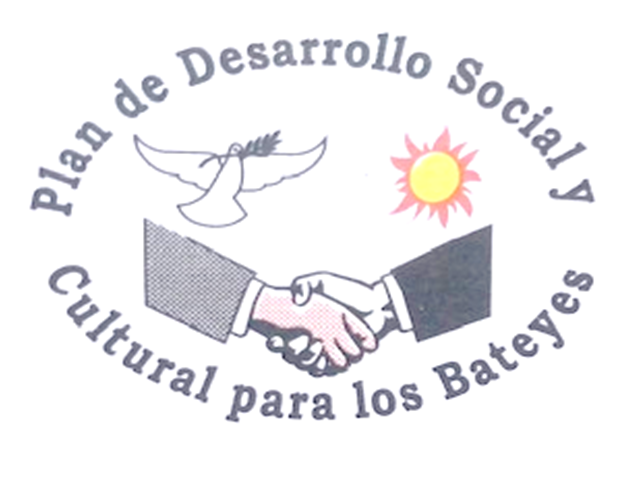
PLADESCULBA: Preschool and Community Centre
PLADESCULBA was founded by director Georges Thertulien, himself Haitian by birth, having moved to the DR as a child. Rayjon connected with Georges in 2002, and we were beyond impressed with his dedication to fight for the most vulnerable. Under his gentle care and direction, today PLADESCULBA is a community hub, offering a best-start preschool for children (complete with a flourishing garden which supplies the children with nutrition food daily), empowering life skills classes for women, and a music program for youth.
The children of Barrio 41 call Georges, “Papa Georges.” For many of them, he is the only positive male role model in their lives, a job which he takes seriously. He spends a lot of time building the self-esteem of not only the children, but also the youth and women in this community.
Largely through Georges’ advocacy, Rayjon gradually began to understand the bigger challenges facing the Barrio 41 community: the horrible human rights abuses and racism toward persons of Haitian descent, the lack of decent housing, and the barriers to equitable and affordable health care and education. To address these problems, we formed two newer partnerships with ASCALA and Puente (below).
ASCALA (Asociación Scalabriniana al Servicio de la Movilidad Humana
is an organization focused on defending human rights and empowerment through personal and social development.
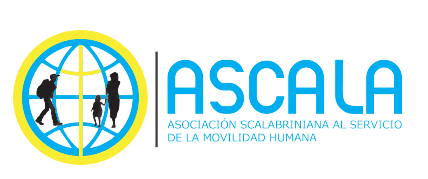
ASCALA: Mobile Medical Clinic
ASCALA: Documentation
With the support of Rayjon, ASCALA operates:
A Mobile Medical Clinic, which provides regular essential health care and medicines to more than 1,700 people living on remote “bateyes” (sugar cane plantations). Many of the workers and their families are undocumented, and therefore unable to safely access essential health care services without fear of deportation, and as they lack the financial resources to do so. In particular, the program offers prenatal care for at-risk pregnant women, accompanies Haitian patients to urgent doctors’ visits (and provides translation), and provides medications for common illness including infections, diabetes and high blood pressure.
We cannot overstate the barriers faced by families of Haitian descent, even those who are Dominican by birth and having lived in the DR for generations. ASCALA operates a highly skilled legal team, who assist families with obtaining the documentation and legal status they need to live, work, and access basic services (education, health care) in the DR. Through the Documentation Program, Rayjon & ASCALA are assisting approximately 65 individuals through the complex, and often costly and lengthy, legal processes.
To learn more, listen to our podcast about this issue, including the voices of the ASCALA legal team! Click here.
Finally, ASCALA is also assisting women from Barrio 41 with acquiring the knowledge and skills they need to become successful entrepreneurs! Training in leadership, financial management and business development culminates each year with an “Expo” where the women shared what they have learned and present their business plans to a panel of judges. 10 women each year receive “seed funding to start their own businesses!
Puente Desarrollo Internacional
connects international organizations (like Rayjon) and local institutions with under-served communities to more efficiently to make development work more collaborative, impactful and sustainable. Their data-driven approach is transforming whole communities!
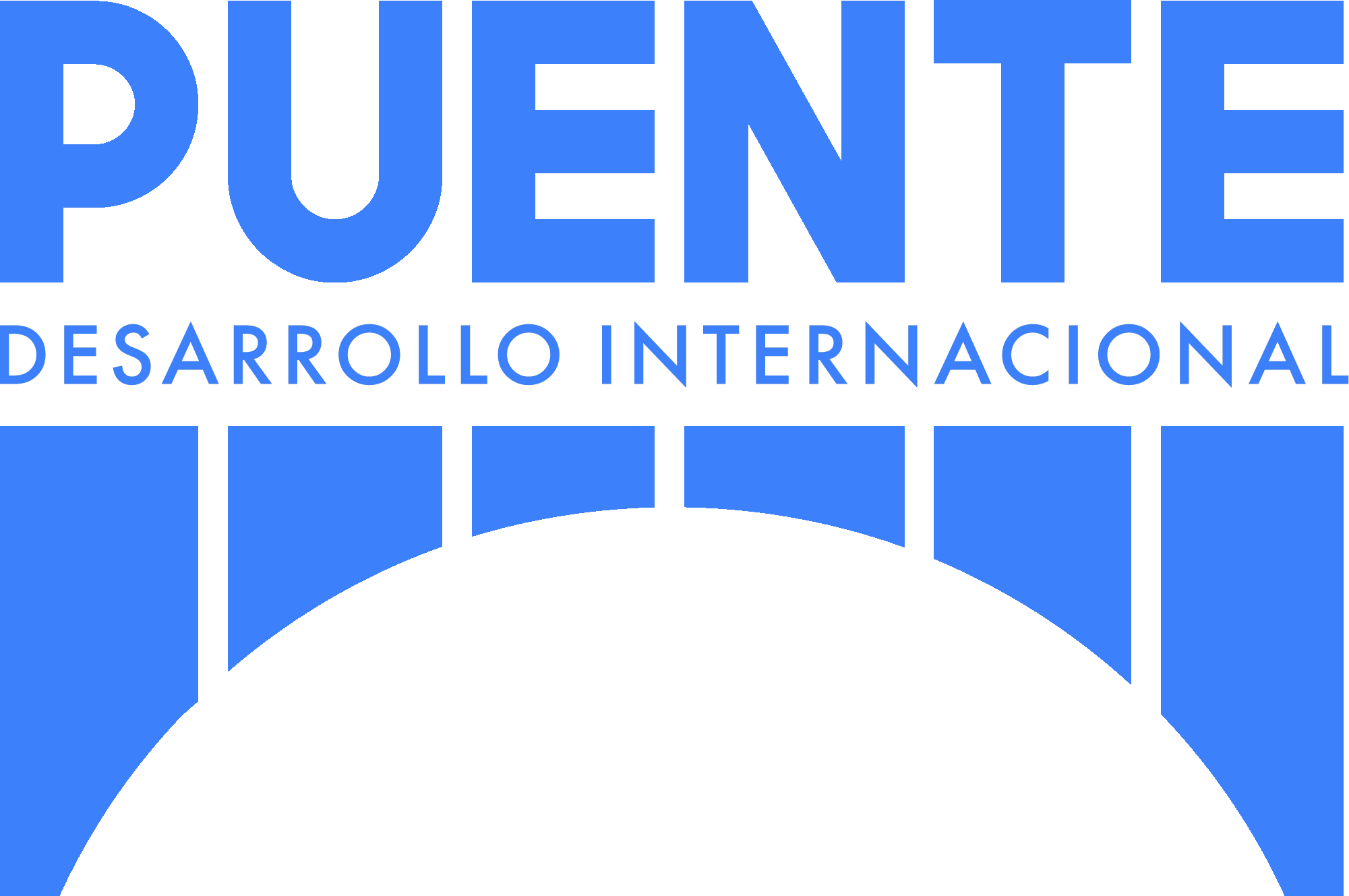
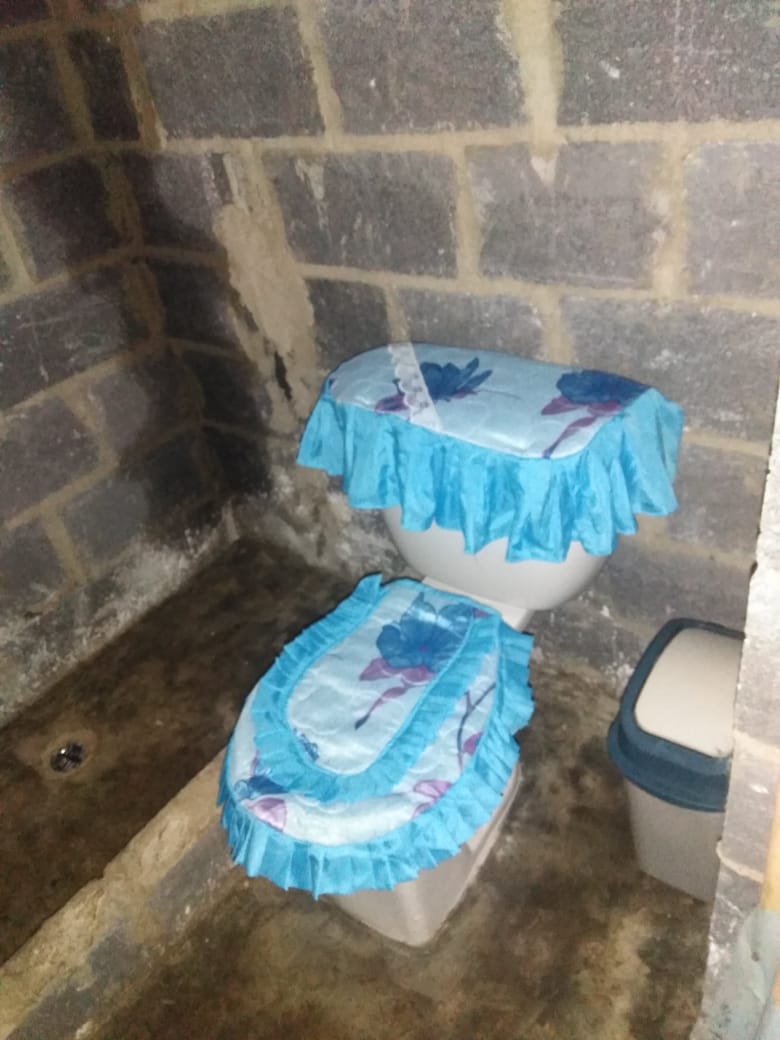
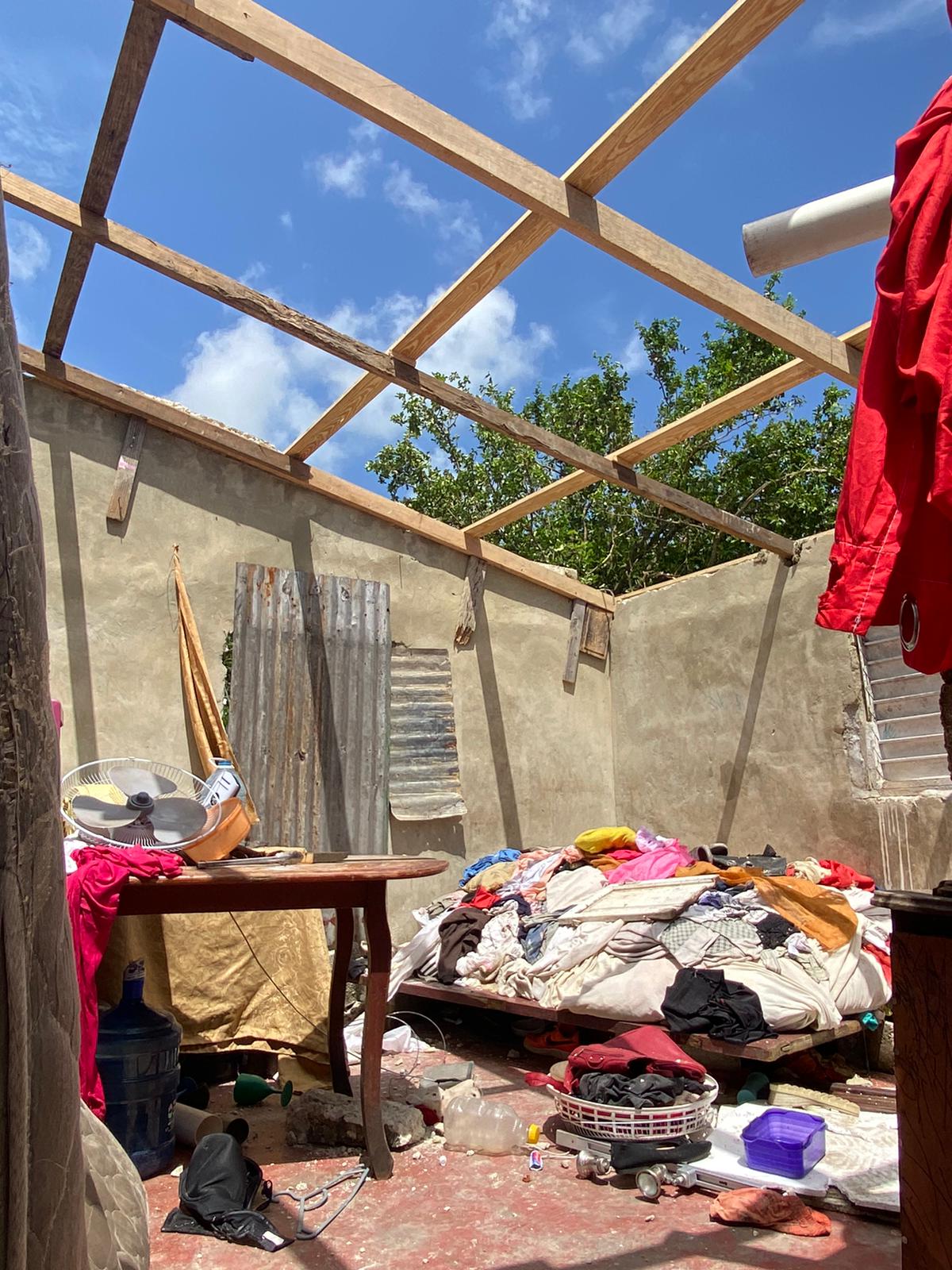
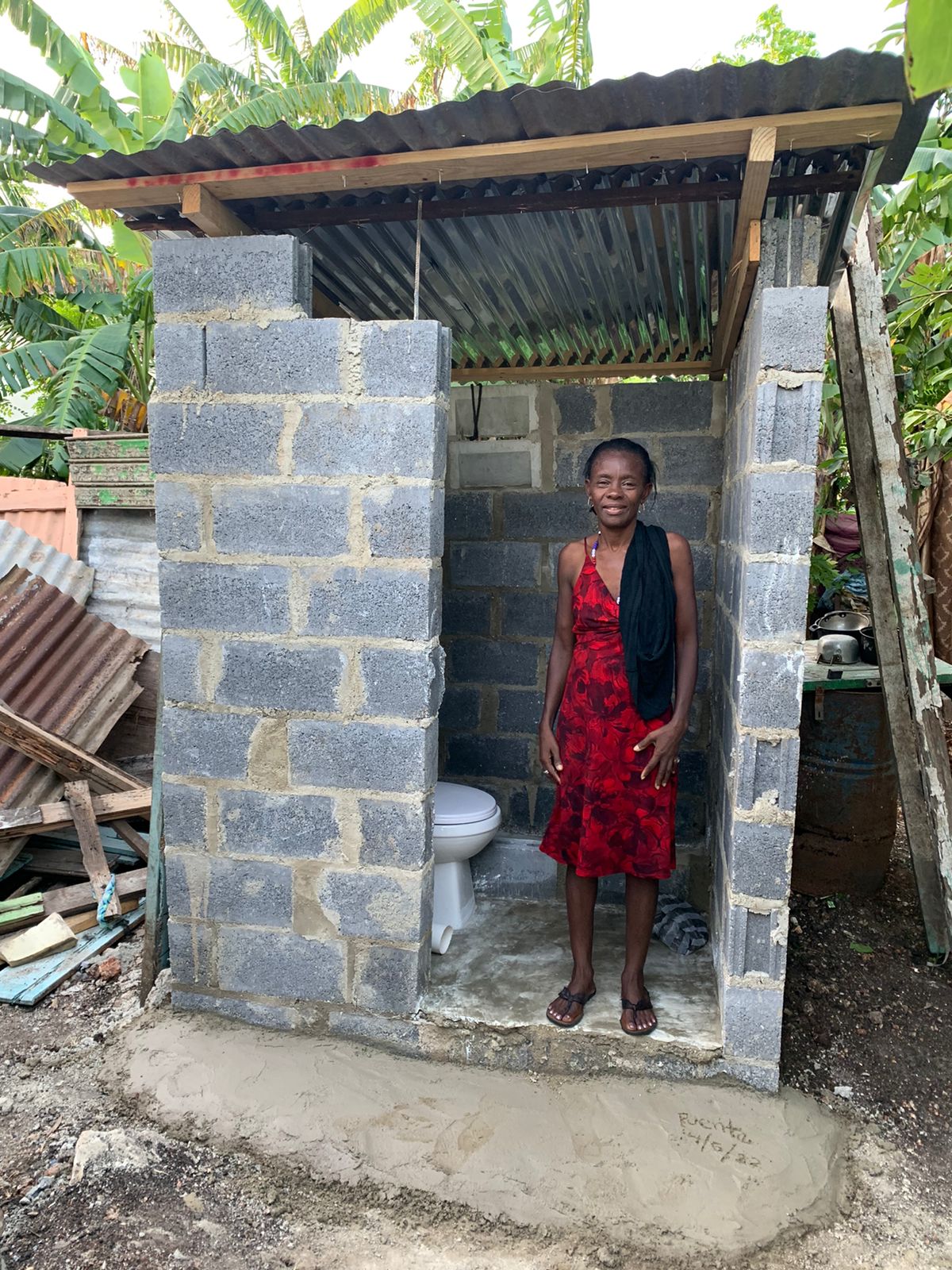

Puente facilitated data collection (with the use of their custom app and door-to-door surveys) in the community of Barrio 41, Consuelo. The data identified the key needs and challenges facing residents.
Data was then presented to the entire community, and they were asked, “What are your priorities?” “How can these issues be solved?” “What can you contribute to help?”
In the photos at right you can see the stunning results of a baños (bathroom) project, a roof project following a hurricane, and a water project that brought safe water to the preschool.
In 2023-2024, Rayjon is partnering with Puente to achieve 2 brand-new projects in two very marginalized communities: a water project that will bring drinking water to 200 families, and a roof project to repair severely damaged homes for 26 families.
The Puente model is brilliant. Community members contribute a minimum of 25% of the total project costs (usually in the form of in-kind labour). Local leaders are trained and empowered. Partnerships are built with the local government, neighbourhood associations, and even local hardware stores! Everyone gets their hands dirty.
